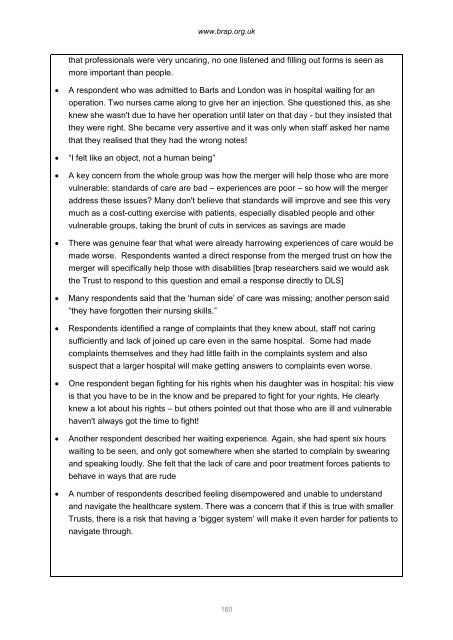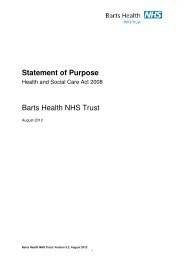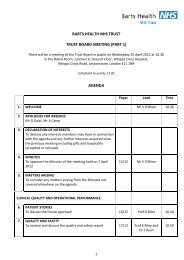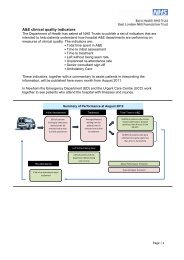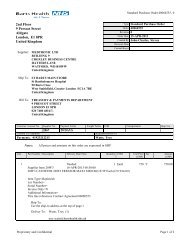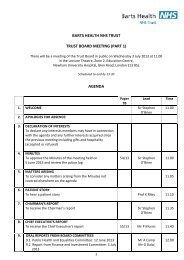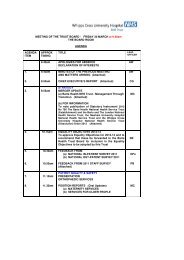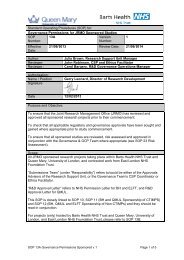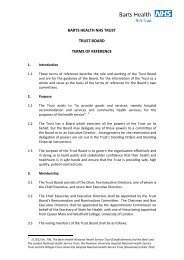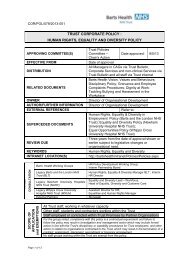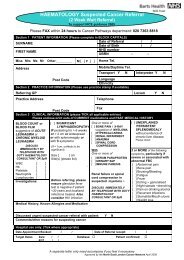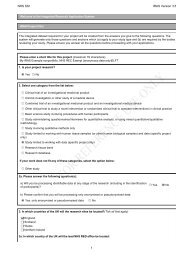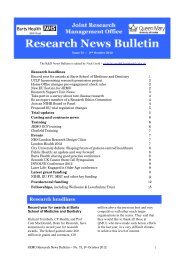Barts Health Equality and Human Rights Impact Assessment Report
Barts Health Equality and Human Rights Impact Assessment Report
Barts Health Equality and Human Rights Impact Assessment Report
- No tags were found...
Create successful ePaper yourself
Turn your PDF publications into a flip-book with our unique Google optimized e-Paper software.
www.brap.org.ukthat professionals were very uncaring, no one listened <strong>and</strong> filling out forms is seen asmore important than people.A respondent who was admitted to <strong>Barts</strong> <strong>and</strong> London was in hospital waiting for anoperation. Two nurses came along to give her an injection. She questioned this, as sheknew she wasn't due to have her operation until later on that day - but they insisted thatthey were right. She became very assertive <strong>and</strong> it was only when staff asked her namethat they realised that they had the wrong notes!“I felt like an object, not a human being”A key concern from the whole group was how the merger will help those who are morevulnerable: st<strong>and</strong>ards of care are bad – experiences are poor – so how will the mergeraddress these issues? Many don't believe that st<strong>and</strong>ards will improve <strong>and</strong> see this verymuch as a cost-cutting exercise with patients, especially disabled people <strong>and</strong> othervulnerable groups, taking the brunt of cuts in services as savings are madeThere was genuine fear that what were already harrowing experiences of care would bemade worse. Respondents wanted a direct response from the merged trust on how themerger will specifically help those with disabilities [brap researchers said we would askthe Trust to respond to this question <strong>and</strong> email a response directly to DLS]Many respondents said that the ‘human side’ of care was missing; another person said“they have forgotten their nursing skills.”Respondents identified a range of complaints that they knew about, staff not caringsufficiently <strong>and</strong> lack of joined up care even in the same hospital. Some had madecomplaints themselves <strong>and</strong> they had little faith in the complaints system <strong>and</strong> alsosuspect that a larger hospital will make getting answers to complaints even worse.One respondent began fighting for his rights when his daughter was in hospital: his viewis that you have to be in the know <strong>and</strong> be prepared to fight for your rights. He clearlyknew a lot about his rights – but others pointed out that those who are ill <strong>and</strong> vulnerablehaven't always got the time to fight!Another respondent described her waiting experience. Again, she had spent six hourswaiting to be seen, <strong>and</strong> only got somewhere when she started to complain by swearing<strong>and</strong> speaking loudly. She felt that the lack of care <strong>and</strong> poor treatment forces patients tobehave in ways that are rudeA number of respondents described feeling disempowered <strong>and</strong> unable to underst<strong>and</strong><strong>and</strong> navigate the healthcare system. There was a concern that if this is true with smallerTrusts, there is a risk that having a ‘bigger system’ will make it even harder for patients tonavigate through.160


